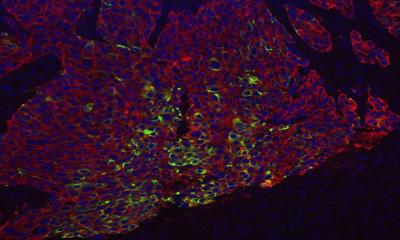Novel Prognostic Marker and Potential Therapeutic Target for Triple Negative Breast Cancer Identified
A new biomarker for an aggressive subtype of breast cancer has been identified, which may also be a potential therapeutic target.
Boston University School of Medicine researchers collaborated with the University of Cyprus to characterize a cell-surface receptor called IL13RA2. This molecule was found to be overexpressed in basal-like breast cancer, a particularly aggressive subtype of breast cancer. This entity tends to affect younger women less than 40 as well as African Americans, is resistant to hormonal therapy, and tends to metastasize more quickly. To date, there was a lack of understanding of why and how these cancers could metastasize.
 Basal-like breast cancer. Courtesy of UNC/Perou Lab
Basal-like breast cancer. Courtesy of UNC/Perou Lab
The researchers used gene expression profiling of basal-like breast cancer cell lines and compared it to public data on breast cancer tumors and their gene expression patterns. Once they identified IL13RA2 as a potential mediator, they also performed in-vivo studies in mice by lentivirus-mediated gene knockdown.
The results showed that IL13RA2 was highly expressed in basal-like breast cancer. Meta-analysis using patient data revealed that the IL13RA2 could be used as a prognostic marker; patients that had overexpression of the receptor tended to fare worse. Furthermore, when the receptor gene was knocked down in vivo, models had slower tumor growth as well as fewer macro metastases to distant organs compared to wild type. Taken together, the researchers reasoned that the receptor plays a crucial role in tumor growth and metastasis.
 Sam Thiagalingam
Sam Thiagalingam
This discovery offers a glimmer of hope for patients stricken with BLBC. “Personalized cancer therapies could be developed by targeting breast cancer cells that express copious levels of IL13RA2,” said Sam Thiagalingam, PhD, with the Boston University School of Medicine.
Furthermore, glioblastomas, pancreatic, ovarian, and colonic cancers can also have high levels of IL13RA2 which suggests its importance in cancer progression. “Studies directed at this biomarker will be of high significance to improve the quality of life of all cancer patients harboring this alteration,” said Thiagalingam.
While this is hopeful news for some patients, Thiagalingam also commented that more research is needed to further understand not only IL13RA2, but other molecules in breast cancers that may guide diagnosis, prognosis, and ultimately drug development and therapy.
The study was supported by the Cyprus Research Promotion Foundation, Republic of Cyprus and the European regional Development Funds, as well as the Susan G. Komen for the Cure Foundation and the National Institutes of Health.
View all posts